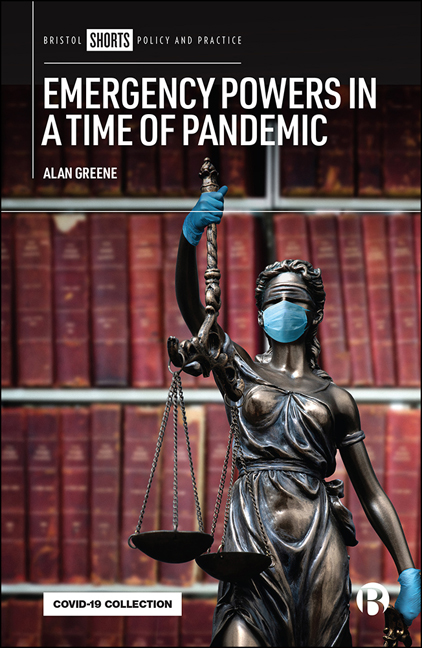Book contents
- Frontmatter
- Contents
- Notes on the Author
- Acknowledgements
- Introduction
- One The Pandemic State of Emergency
- Two Pandemics and Human Rights: Non-Derogable Rights
- Three Pandemics and Human Rights: Derogable Rights
- Four Pandemics and Democracy
- Five The End of the Pandemic Emergency
- Six Conclusions: Breathing Space
- Index
Two - Pandemics and Human Rights: Non-Derogable Rights
Published online by Cambridge University Press: 12 March 2021
- Frontmatter
- Contents
- Notes on the Author
- Acknowledgements
- Introduction
- One The Pandemic State of Emergency
- Two Pandemics and Human Rights: Non-Derogable Rights
- Three Pandemics and Human Rights: Derogable Rights
- Four Pandemics and Democracy
- Five The End of the Pandemic Emergency
- Six Conclusions: Breathing Space
- Index
Summary
Introduction
As emergency powers impact upon the most fundamental values in a legal order, this chapter and Chapter Three (Pandemics and Human Rights: Derogable Rights) explore the effect that pandemic emergency powers can have on human rights norms. Focus is not simply on the states that have officially declared states of emergency or derogated from international human rights treaties, as there is no necessary correlation between the impact that these measures have on human rights and whether a state has derogated or not.
While this is not the place for an in-depth discussion of the different theories of human rights, some articulation is, nevertheless, necessary in order to establish a framework against which pandemic emergency powers can be appraised. Here, I argue that human rights work best when they are understood as having an emancipatory potential – when they are viewed as requiring the state not just to refrain from interfering with a person's life, but also to take positive steps to empower a person to take control of their life. In contrast, a libertarian conception of rights as simply injuncting the state from acting would be incapable of effecting an adequate response to the pandemic, as evidenced by protesters refusing to wear masks that can impede the spread of the virus.
This ‘emancipatory potential’ of human rights also shapes who is empowered to make decisions about rights in a state. On this point, I argue that all branches of government – legislature, executive and judiciary – must take this this obligation seriously. In this way, constitutional norms are best protected when this ‘culture of justification’ is established. These two concepts – the emancipatory potential of human rights; and a culture of justification – shape my analysis of the impact of pandemic responses on these rights.
This chapter focuses on non-derogable rights – rights whose protection cannot be affected by the declaration of a de jure state of emergency. As I will show, these rights are particularly important in a pandemic, and place significant duties on the state to protect and vindicate these rights. This further demonstrates that, even with a de jure declared state of emergency, robust human rights protection can – and should – be in place.
- Type
- Chapter
- Information
- Emergency Powers in a Time of Pandemic , pp. 35 - 60Publisher: Bristol University PressPrint publication year: 2020

